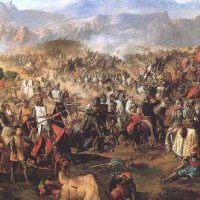Islam and the Closing of the Secular Mind, by Samuel Gregg
Given the decidedly strange response of the Obama Administration and much of the Western commentariat to the violence sweeping the Islamic world, one temptation is to view their reaction as simple incomprehension in the face of the severe unreason that leads some people to riot and kill in a religion’s name. But while the Administration’s response has plenty to do with trying to defend a foreign policy that has plainly gone south, it also reflects something far more problematic: the Western secular mind’s increasing inability to think seriously and coherently about religion at all.
This problem manifests itself in several ways. The first is the manner in which many secular thinkers seem to regard all religions as “basically the same.” By this, they often mean either equally irrational or as promoting essentially similar values.
A moment’s reflection would indicate to even the most militant atheist that this simply isn’t true. Islam and Christianity, for instance, have very different understandings of who Jesus Christ is. Christians believe that he is God, the second Person of the Trinity. Muslims do not. Ergo, Islam and Christianity are not effectively the same. At their respective cores are fundamentally irreconcilable theological positions. It’s also very difficult to find robust affirmations of free will outside Judaism and Christianity (at least the orthodox varieties of these two faiths).
Likewise, as any informed Muslim will tell you, Islamic theology has no real equivalent of the Christian idea of the church. The Greek word for “church” (ekklesia) literally means to be “called out.” That, alongside Christ’s words about the limits to Caesar’s power, had immense implications for how Christians think about the state and its relationship to religion. Among other things, it means Christianity has always maintained significant distinctions between the temporal and the spiritual realms that are far less perceptible — again, as any pious Muslim will inform you — in Islamic theology and history.
All this, however, is a little complicated for those secular intellectuals who simply regard religion as just another lifestyle-choice rather than being essentially about people’s natural desire to (1) know the truth about the transcendent and (2) live their lives in accordance with such truths.
Read the complete article in Catholic Education Resource Center
The Battle of Las Navas de Tolosa: The Culture and Practice of Crusading in Medieval Iberia
Abstract: This study examines the phenomenon of crusading in the Iberian Peninsula through the lens of the battle of Las Navas de Tolosa (1212). This battle was both a major Christian victory over the Almohad Empire of Morocco and its Andalusian allies, and the most successful crusade of the papacy of Innocent III. As such, it serves as an ideal case study for the practice and culture of crusading in the early thirteenth century.
The examination of the battle helps to expand our understanding of crusading in a number of ways. First, by examining the institutional aspects of the battle, against the backdrop of the career of Innocent III, it becomes clear that Las Navas was the first crusade in which all of the aspects of papal crusade policy were successfully brought together and implemented. The victory gave the Pope the confidence and capital to officially institutionalize the crusade shortly thereafter in 1215. Secondly, a close study of the participants reveals that, despite the development of official crusade practices, there were many disparate views on what exactly it meant to go on crusade, and what crusaders were expected to do. The Iberian Christians differed greatly from many of the international crusaders both in their cultural attitudes and their expectations of the campaign. For the French participants, the campaign was part of a well-established crusading tradition, passed down from their ancestors. For the Spanish, crusade was a new concept, just beginning to take hold and influence their approach to the regular warfare with their Muslim neighbors. However, the victory of Las Navas helped to solidify and expand the acceptance of crusade ideology in the minds of the Iberian Christians in the ensuing years.
Click here to read this thesis from the University of Tennessee

